五年级一般现在时
小学英语五年级一般现在时态总结及练习

一般现在时(1)一般现在时中的be动词:一般用原形:am is aream用于第一人称单数(I);is用于第三人称单数(he she it和其他人名或称谓,如:Ben his sister 等);are用于第二人称单数(you)和所有复数(包括第一人称复数we、第二人称复数you;第三人称复数they和其他复数,如the children 、his parents等)。
(2)一般现在时中的动词:第一种情况:主语是第三人称单数(he she it 和其他,如Helen 、her cousin 等),动词后一般加s或es。
第二种情况:主语不是第三人称单数,动词都用原形。
(4)一般现在时判断依据(如何判断一个句子是一般现在时):△be动词是am、is、are △动词用原形或加s、es△没有时间状语或有usually、often、everyday、sometimes等不是具体的时间一般现在时态练习题一一、写出下列单词的第三人称单数形式。
ask---- meet---- teach---- sit----kick---- look---- listen---- eat----put---- knock---- open---- give----see---- pull---- show---- wash----try---- take---- wake---- shut----count---- share---- post---- play----hide---- seek---- hold---- stand----do---- jump---- stop---- touch----二、写出下列动词的原形。
ends---- rains---- shines---- rises----sets---- sleeps---- gets---- goes----stays---- arrives---- walks---- drives----spends---- forecasts---- fixes---- works----travels---- cleans----三、用所给动词的一般现在时填空。
五年级一般现在时总结
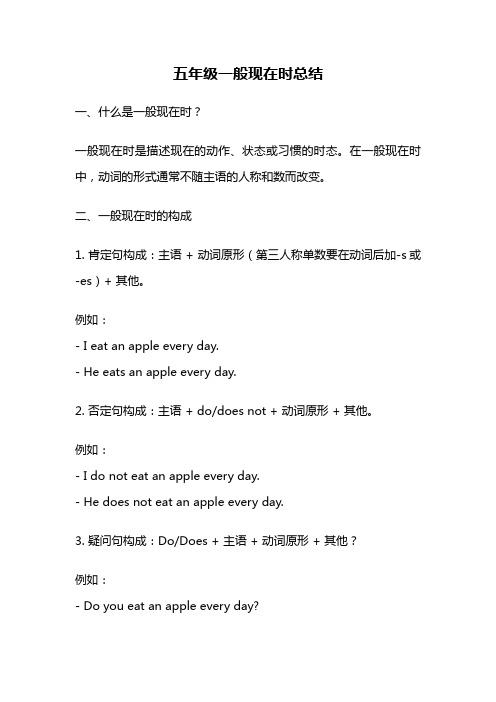
五年级一般现在时总结一、什么是一般现在时?一般现在时是描述现在的动作、状态或习惯的时态。
在一般现在时中,动词的形式通常不随主语的人称和数而改变。
二、一般现在时的构成1. 肯定句构成:主语 + 动词原形(第三人称单数要在动词后加-s或-es)+ 其他。
例如:- I eat an apple every day.- He eats an apple every day.2. 否定句构成:主语 + do/does not + 动词原形 + 其他。
例如:- I do not eat an apple every day.- He does not eat an apple every day.3. 疑问句构成:Do/Does + 主语 + 动词原形 + 其他?例如:- Do you eat an apple every day?- Does he eat an apple every day?三、一般现在时的用法1. 描述经常性动作或习惯。
例如:- She brushes her teeth twice a day.- We go to school from Monday to Friday.2. 表示客观事实或普遍真理。
例如:- The sun rises in the east.- Water boils at 100 degrees Celsius.3. 用于表示现阶段的情况或状态。
例如:- I am a student.- They live in a big house.4. 用于表示感觉、意见、喜好等心理状态动词。
例如:- I like playing soccer.- She loves watching movies.四、一般现在时的时间状语时间状语是用来修饰一般现在时的词语,常用的时间状语有:1. 每天(every day)- I go for a walk every day.2. 经常(often)- They often play basketball after school.3. 有时候(sometimes)- He sometimes helps his mother with housework.4. 通常(usually)- We usually have dinner at 6 o'clock.5. 从不(never)- She never eats fast food.五、注意事项1. 第三人称单数的动词要加-s或-es。
五年级英语一般现在时练习题40题

五年级英语一般现在时练习题40题1.She often ______ books after school.A.readB.readsC.readingD.to read答案:B。
本题考查一般现在时第三人称单数的用法。
主语she 是第三人称单数,谓语动词要用第三人称单数形式reads。
选项 A read 是动词原形;选项C reading 是现在分词;选项D to read 是动词不定式。
2.He ______ to school by bus every day.A.goB.goesC.goingD.to go答案:B。
主语he 是第三人称单数,谓语动词要用goes。
选项A go 是动词原形;选项C going 是现在分词;选项D to go 是动词不定式。
3.My sister ______ swimming on weekends.A.likeB.likesC.liking答案:B。
主语my sister 是第三人称单数,谓语动词要用likes。
选项 A like 是动词原形;选项C liking 是现在分词;选项D to like 是动词不定式。
4.The cat ______ fish.A.likeB.likesC.likingD.to like答案:B。
主语the cat 是第三人称单数,谓语动词要用likes。
选项 A like 是动词原形;选项C liking 是现在分词;选项D to like 是动词不定式。
5.My father ______ newspapers in the morning.A.readB.readsC.readingD.to read答案:B。
主语my father 是第三人称单数,谓语动词要用reads。
选项 A read 是动词原形;选项C reading 是现在分词;选项D to read 是动词不定式。
6.She ______ music very much.A.likeC.likingD.to like答案:B。
小学五年级英语语法-一般现在时句型变化

一、陈述句是陈述一个事实或者说话人的看法,分为肯定的陈述句和否定的陈述句,简称为肯定句和否定句。
1.肯定句:基本结构:主+谓+宾,或者主+系(动词)+表(1)联系动词(简称系动词)be根据主语的变化而产生的变形(我是am,你是are,他她它is,复数are)。
性质主语系动词表语主系合写主语为第一人称单数I am King.I'm主语为第二人称单数You are Nicole.You're主语为第三人称单数He is Tommy.He's主语为第三人称单数She is Kitty.She's主语为第三人称单数It is a dog.It's主语为第三人称单数Kitty is my classmate.主语为第二人称复数You are good friends.You're主语为第三人称复数Gray and Nicole are my parents.主语为第三人称复数Tommy,King and Mike are my good friends.表语为单数,主语随表语单复数变化This is an apple.This's表语为单数,主语随表语单复数变化That is an orange.That's表语为复数,主语随表语单复数变化These are six apples.These're 表语为复数,主语随表语单复数变化Those are fifteen oranges.Those're 表语为单数,主语不随表语单复数变化Here is a book in the box.Here's表语为单数,主语不随表语单复数变化There is a cup on the desk.There's表语为复数,主语不随表语单复数变化Here are three books in the box.Here're表语为复数,主语不随表语单复数变化There are seven cups on the desk.There're(2)情态动词can,may,shall,will根据主语的变化而产生的变形。
一般现在时(讲义)人教PEP版英语五年级下册
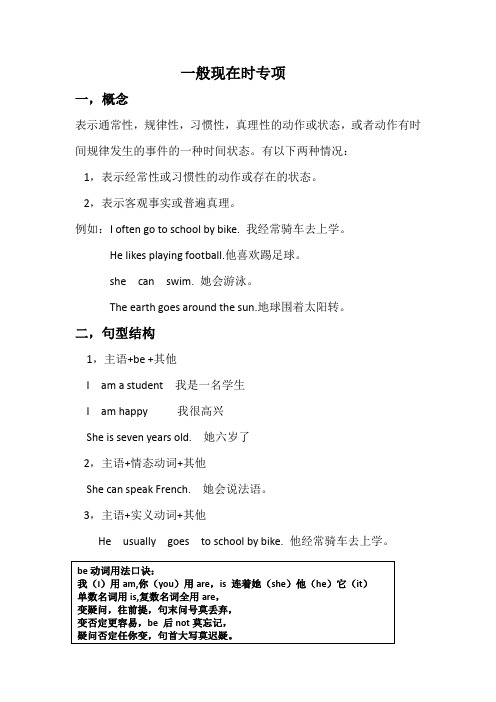
一般现在时专项一,概念表示通常性,规律性,习惯性,真理性的动作或状态,或者动作有时间规律发生的事件的一种时间状态。
有以下两种情况:1,表示经常性或习惯性的动作或存在的状态。
2,表示客观事实或普遍真理。
例如:I often go to school by bike. 我经常骑车去上学。
He likes playing football.他喜欢踢足球。
she can swim. 她会游泳。
The earth goes around the sun.地球围着太阳转。
二,句型结构1,主语+be +其他I am a student 我是一名学生I am happy我很高兴She is seven years old. 她六岁了2,主语+情态动词+其他She can speak French. 她会说法语。
3,主语+实义动词+其他He usually goes to school by bike. 他经常骑车去上学。
1,be 动词和情态动词的变化。
(1)否定句:主语+be/情态动词+not+其他He is not a doctor she can not speak French(2)一般疑问句:be+主语+其它Are you a student? Can you sing ?(3)特殊疑问句:疑问词+一般疑问句Where is my ruler?2,行为动词的变化。
(1)否定句:主语+don`t(doesn't)+动词原形(+其它)I don`t like apples当主语为第三人称单数时,要用doesn't构成否定句She doesn't often play piano(2)一般疑问句:Do(Does)+主语+动词原形+其它Do you often play football? Yes,I do/No, I don’t. (3)当主语为第三人称单数时,要用does构成一般疑问句Does she go to work by bike? Yes ,she does/No ,she doesn't (4)特殊疑问句:疑问词+一般疑问句。
五年级英语“一般现在时”知识归类
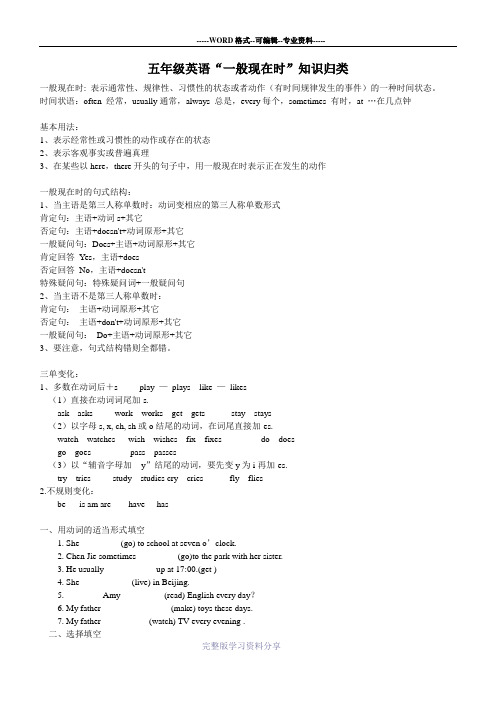
五年级英语“一般现在时”知识归类一般现在时: 表示通常性、规律性、习惯性的状态或者动作(有时间规律发生的事件)的一种时间状态。
时间状语:often 经常,usually通常,always 总是,every每个,sometimes 有时,at …在几点钟基本用法:1、表示经常性或习惯性的动作或存在的状态2、表示客观事实或普遍真理3、在某些以here,there开头的句子中,用一般现在时表示正在发生的动作一般现在时的句式结构:1、当主语是第三人称单数时:动词变相应的第三人称单数形式肯定句:主语+动词s+其它否定句:主语+doesn't+动词原形+其它一般疑问句:Does+主语+动词原形+其它肯定回答Yes,主语+does否定回答No,主语+doesn't特殊疑问句:特殊疑问词+一般疑问句2、当主语不是第三人称单数时:肯定句:主语+动词原形+其它否定句:主语+don't+动词原形+其它一般疑问句:Do+主语+动词原形+其它3、要注意,句式结构错则全都错。
三单变化:1、多数在动词后+s play —plays like —likes(1)直接在动词词尾加-s.ask---asks work---works get---gets stay---stays(2)以字母s, x, ch, sh或o结尾的动词,在词尾直接加-es.watch---watches wish---wishes fix---fixes do---doesgo---goes pass---passes(3)以“辅音字母加- y”结尾的动词,要先变y为i再加-es.try---tries study---studies cry---cries fly---flies2.不规则变化:be---- is am are have----has一、用动词的适当形式填空1. She _________(go) to school at seven o’clock.2. Chen Jie sometimes _________(go)to the park with her sister.3. He usually ___________ up at 17:00.(get )4. She ___________ (live) in Beijing.5. ________ Amy _________ (read) English every day?6. My father _______________ (make) toys these days.7. My father __________ (watch) TV every evening .二、选择填空1.I want____homework now.A. doingB. to doC. to do myD. do my2.It's time______.A. go to schoolB. play gamesC. to go homeD. to do my homeworks 3.______go and help her.A. Let's meB. Let's usC. Let'sD. Let's to4.Do they have a new car? Yes,_____.A .they are B.they have C. they don't D. they do5.He often _________ supper at 6:00 in the evening.A. haveB. has c. is having D. is eating6. We _____________ any Chinese classes on Friday.A. are havingB. aren’t havingC. don’t haveD. are have三、用括号内动词的适当形式填空。
五年级一般现在时和介词的用法语法

语法:一、一般现在时一般现在时表示:1.经常发生的动作或存在状态,常和always(总是), usually(通常), often(经常), sometimes(有时候), everyday(每天), every week(每周)等时间状语连用。
2.表示普遍真理陈述句:肯定句:《主语+be动词~》1.I am a teacher.我是老师《主语+动词~》I often play football on Sundays. 我经常在周日踢足球。
第三人称单数+动词-s或-es.>She likes summer. 她喜欢夏天否定句:1,主语+be动词+not~You are not a student. 你不是学生2,主语+do not +动词~I don’t go to school every day.我每天不去上学<第三人称单数+does not+动词~>She doesn’t go shopping on Saturdays. 她在周六不购物。
一般疑问句(句型、用法)陈述句变一般疑问句时,1. 把be动词移到主语前面,即《Be动词+主语~》如: ------Are you a student?------Yes, I am.2. 把do或does移到句首,即《Do (Does)+主语+动词原型~》如:------Do you have English class on Mondays?------ No, we don’t.------ Does he play football every day?------ Yes, he does.用所给词的适当形式填空1. I ______to school from Monday to Friday. My brother often _______to school with me.(go)2.They usually _______lunch at school canteen. ( have )3. My sister likes ________very much. She often _______at her bedroom.( sing )4._________your grandparents often _________(take)exercise in the morning?5. Jane ________every day. Look! She_____________in the music room.( dance )6.__________that young man _________(work)in a toy factory?按要求改写句子1. It often rains in summer here. (改为一般疑问句)__________ it often _________ in summer here?2. I like autumn best. (改为否定句)I ________ _________ autumn best.3.She often cleans his bedroom on Saturday. (改为否定句)She ___________ often __________ his bedroom on Saturday 4.The boy can jump high. (改为否定句)The boy __________ jump high.5. The boys are playing football.(改为一般疑问句)__________ the boys __________ football?6.My mother is a bank clerk.(改为否定句)My mother __________ a bank clerk.二、介词in, on , at 的运用1.表示方位in在…里面on 在…上面in my bag on the wall2.表示在某个地点in(大地点)at 小地点in China in Guangzhouat the Zoo at home3. in, on, at表示在某个时间in 表示在一段时间里,如年、月、季节in 2011 in September in summeron 表示在具体的一天或一天中的某个时段,如5月1日、星期一、星期天的早上on May 1st on Monday On Sunday morningat表示在几点钟,如在5:30at half past five还有一些固定搭配,需熟记in the mornig\afternoon\evening at noon\night\midnightat the weekend on weekdays注意:季节、月份、星期、早中晚等表示时间的词,当前面有修饰词this nextlast every时,前面不用介词。
五年级下英语:一般现在时及习题

五年级下册英语重点语法解析:一般现在时小学五年级英语下册有三大重点语法:一般现在时、一般进行时、一般将来时。
这三大时态是我们学好英语的基础,必须要牢牢掌握。
助手将和大家详细解析以上三大时态的用法,今天我们先来学习“一般现在时”。
一般现在时是小学英语的重要语法知识点,也是上了初中后要学习的最重要的语法内容之一。
一般现在时主要用来表示经常性或习惯性的动作,或者是现在的特征或所处的状态。
一般现在时看似最简单,其实它和其它时态最不一样。
其它时态说的都是具体时间发生的具体事件,而一般现在时强调的是一段时间内的状态或反复发生的动作,即客观事实。
1. 谓语是be(am/is/are)的一般现在时。
①肯定形式:主语+be+表语(形容词、名词充当表语)。
I am hungry.You are beautiful.He is a doctor.②否定形式:主语+be+not+表语(形容词、名词充当表语)。
I am not hungry.You aren't beautiful.He isn't a doctor.③一般疑问句形式:Be+主语+表语(形容词、名词充当表语)? 肯定回答:Yes,主语+be. 否定回答:No, 主语+ be+not.—Are you hungry?—Yes,I am./No,I'm not.—Is he a doctor?—Yes, he is./No, he isn,t.④特殊疑问句形式:特殊疑问词+Be开头的一般疑问句?—What is he?—He is a doctor.注意:be要随着主语变。
2. 谓语是情态动词can/may.....+动词原形的一般现在时。
①肯定形式:主语+情态动词can/may.....+动词原形+宾语。
I can finish my homework.②否定形式:主语+情态动词can/may.....+not+动词原形+宾语。
I can't finish my homework.③一般疑问句形式:情态动词Can/May.....+主语+动词原形+主语+宾语。
五年级英语时态大全

五年级英语时态大全一、一般现在时。
1. 概念。
- 表示经常发生的动作或存在的状态。
例如:I often play football on Sundays.(我经常在周日踢足球。
)- 表示客观事实或真理。
例如:The earth goes around the sun.(地球绕着太阳转。
)2. 动词形式。
- 当主语是第三人称单数(he/she/it或单个的人名、地名等)时,动词要使用第三人称单数形式(一般在动词原形后加 -s或 -es)。
例如:He likes reading books.(他喜欢读书。
)- 当主语是第一人称(I)、第二人称(you)、复数(we/they)时,动词使用原形。
例如:We go to school by bike.(我们骑自行车去上学。
)3. 句型结构。
- 肯定句:主语+动词(原形/第三人称单数形式)+其他。
例如:My mother makes a cake.(我妈妈做蛋糕。
)- 否定句:主语+don't/doesn't+动词原形+其他。
例如:I don't like apples.(我不喜欢苹果。
)He doesn't go to school on Saturday.(他周六不去上学。
)- 一般疑问句:Do/Does+主语+动词原形+其他? 例如:Do you like music?(你喜欢音乐吗?)Does she play the piano?(她弹钢琴吗?)二、现在进行时。
1. 概念。
- 表示现在正在进行的动作或存在的状态。
例如:Look! The boy is running.(看!那个男孩正在跑步。
)2. 动词形式。
- 动词be(am/is/are)+动词的 -ing形式。
例如:I am reading a book.(我正在读一本书。
)They are playing games.(他们正在玩游戏。
)3. 句型结构。
- 肯定句:主语+be(am/is/are)+动词 -ing形式+其他。
五年级英语一般现在时
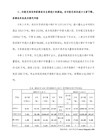
非三单 主语 + 动词原形 + 其他 In the UK, children often sit around tables in class.
三单 主语 + 动词三单 + 其他 In the UK, school often starts at 9 o’clock.
13. My mother usually _____ clothes after dinner.
A. wash B. washed C. washes
17. We _____ watching movies at home.
A. like B. likes C. liking
含义:表示经常发生的动作或习惯性的动作
标志词:always, usually, often, sometimes, never, every 系列……
结构:
主语 结构 例句
10. My grandma often _____ in the park.
A. dances B. dance C. danced
12. Ben and Peter always _____ very hard at school.
A. study B. studies C. studys
14. She often _____ milk for breakfast.
A. have B. has C. had
A. read B. reading C. reads
6. My sister always _____ TV on Saturday.
A. finish B. finishes C. finishing
5. They _____ funny books every day.
五年级英语动词时态归纳
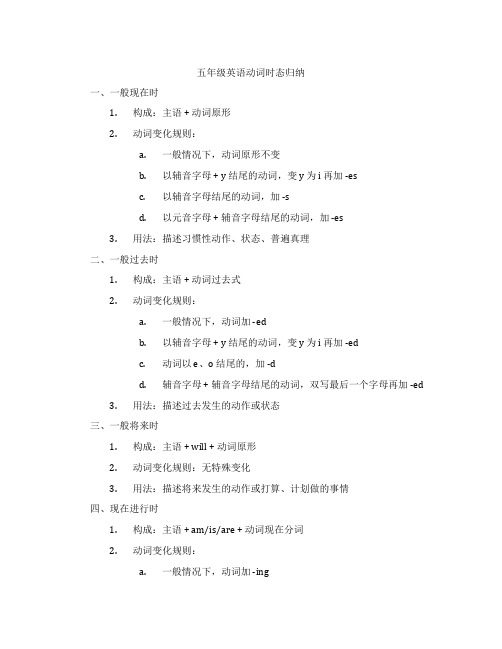
五年级英语动词时态归纳一、一般现在时1.构成:主语 + 动词原形2.动词变化规则:a.一般情况下,动词原形不变b.以辅音字母 + y 结尾的动词,变 y 为 i 再加 -esc.以辅音字母结尾的动词,加 -sd.以元音字母 + 辅音字母结尾的动词,加 -es3.用法:描述习惯性动作、状态、普遍真理二、一般过去时1.构成:主语 + 动词过去式2.动词变化规则:a.一般情况下,动词加 -edb.以辅音字母 + y 结尾的动词,变 y 为 i 再加 -edc.动词以 e、o 结尾的,加 -dd.辅音字母 + 辅音字母结尾的动词,双写最后一个字母再加 -ed3.用法:描述过去发生的动作或状态三、一般将来时1.构成:主语 + will + 动词原形2.动词变化规则:无特殊变化3.用法:描述将来发生的动作或打算、计划做的事情四、现在进行时1.构成:主语 + am/is/are + 动词现在分词2.动词变化规则:a.一般情况下,动词加 -ingb.以辅音字母 + y 结尾的动词,变 y 为 i 再加 -ingc.动词以 e 结尾的,加 -ing 结尾的动词,加 -ingd.辅音字母 + 辅音字母结尾的动词,双写最后一个字母再加 -ing3.用法:描述正在进行的动作或存在的状态五、过去进行时1.构成:主语 + was/were + 动词现在分词2.动词变化规则:a.be 动词根据主语变化,I was,you were,he/she/it was,wewere,they wereb.一般情况下,动词加 -ing3.用法:描述过去正在进行的动作六、现在完成时1.构成:主语 + have/has + 过去分词2.动词变化规则:a.have/has 根据主语变化b.一般情况下,动词加 -ed3.用法:描述过去发生的动作对现在造成的影响或结果七、过去完成时1.构成:主语 + had + 过去分词2.动词变化规则:无特殊变化3.用法:描述过去某个时间点之前已经完成的动作八、被动语态1.构成:主语 + be 动词的过去分词 + by + 执行动作的人或物2.动词变化规则:a.be 动词根据主语变化b.一般情况下,动词加 -ed3.用法:强调动作的承受者九、情态动词1.常用的情态动词:can、may、must、should、will、woulda.can:表示能力、可能性、请求、允许b.may:表示请求、允许c.must:表示必须、肯定、强制d.should:表示应该、应当、建议e.will:表示意愿、承诺、将来f.would:表示意愿、过去习惯、假设十、动词短语1.动词 + 副词2.动词 + 介词3.动词 + 名词4.动词 + 动词以上是对五年级英语动词时态的归纳,希望对你有所帮助。
牛津小学五年级英语上学期英语语法(三)一般现在时
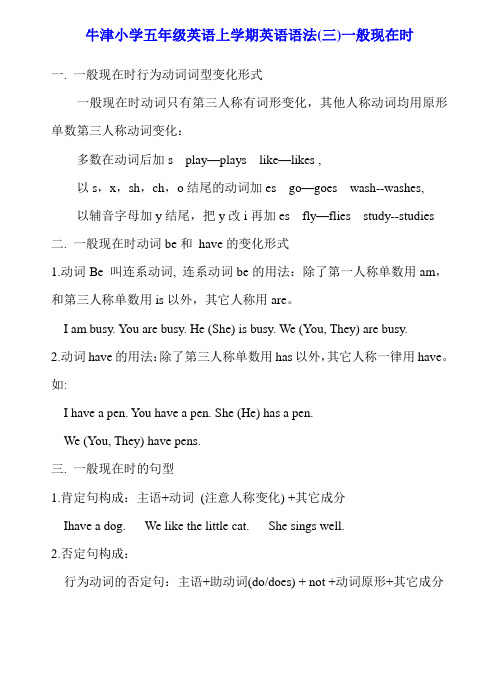
牛津小学五年级英语上学期英语语法(三)一般现在时一. 一般现在时行为动词词型变化形式一般现在时动词只有第三人称有词形变化,其他人称动词均用原形单数第三人称动词变化:多数在动词后加s play—plays like—likes ,以s,x,sh,ch,o结尾的动词加es go—goes wash--washes,以辅音字母加y结尾,把y改i再加es fly—flies study--studies二. 一般现在时动词be和have的变化形式1.动词Be 叫连系动词, 连系动词be的用法:除了第一人称单数用am,和第三人称单数用is以外,其它人称用are。
I am busy. You are busy. He (She) is busy. We (You, They) are busy.2.动词have的用法:除了第三人称单数用has以外,其它人称一律用have。
如:I have a pen. You have a pen. She (He) has a pen.We (You, They) have pens.三. 一般现在时的句型1.肯定句构成:主语+动词(注意人称变化) +其它成分Ihave a dog. We like the little cat. She sings well.2.否定句构成:行为动词的否定句:主语+助动词(do/does) + not +动词原形+其它成分He dosen’t have a dog.He isn’t young.We don’t like the little cat.(借助于助动词do) She doesn’t sing well. (借助于助动词does)3.一般疑问句:A.行为动词的一般疑问句:助动词(do/does)+主语+动词原形+ 其它成分Do you like it? Yes, I do. / No. I don’t .Does he(she) like it? Yes, he( she )does. / No, he ( she )doesn’t.B. 动词BE 的一般疑问句Am / Is /Are +主语+ 其它成分Are you a teacher? Yes, I am. / No, I am not.Are they students of your school.Yes they are / No they aren,t.4.特殊疑问句:特殊疑问词+ 一般疑问句How many students are there in your school?What do you usually do on Sunday?四.一般现在时的用法1.经常性或习惯性的动作,常与表示频度的时间状语连用。
一般现在时笔记练习(讲义)-译林版英语五年级上册

五年级上册一般现在时一、一般现在时的定义:① ① ①二、标志词① ① ① ① ① ①四、构成(一)含有be动词的一般现在时:肯定句:主语+ + 其他否定句:主语+ + + 其他一般疑问句:+ 主语+ 其他?否定句注意事项:疑问句注意事项:(二)含有行为动词的一般现在时:【口诀】①;②;【句式】:主语三单:主语+ + ···肯定句:主语非三单:主语+ + ···主语三单:主语+ + + ···否定句:主语非三单:主语+ + + ···主语三单:+ 主语+ + ···?一般疑问句:主语非三单:+ 主语+ + ···?(三)Be动词am,is,are用法:(四)动词三单的变化规则:1.一般情况下.2.以,加.3. ,.4.特殊的,.【跟踪训练】一.写出下列动词的三单形式1.brush2.drive3.pass4.swim5.call6.carry7.find8.play9.take 10.fly11.push12.teach13.e14.go15.read16.try17.cook18.have19.run20.wash21.dance22.help23.say24.watch25.do26.like27.see28.wish29.draw30.look31.stay 32.work33.drink34.make35.study36.write37.buy38.are39.put二.用所给词的适当形式填空1.Miss Li’s son (have) any animal friends?Yes,he .2.Mike and Liu Tao (have) any toys? No,they .3.Rubber Duck (carry) an umbrella.4.Mary and her parents often (visit) her grandparents at weekends.5.Mr and Mrs Green (not) (work) on Sundays.6.She (watch) films with (she) classmates.7.Who (teach) you English? Mr Green .8.I (not like) reading stories.But she .9.What your mother (do) from Monday to Friday?She (watch) TV at home.10.He (not study) English after school.He (study) English after school.11.Liu Tao likes (swim) and (skate).12.Nancy (have) two (fish).Nancy’s fish (have) big eyes and big bodies.13.What Su Yang usually do at weekends? She usually (fly) kites.14.Wang Bing and Liu Tao (have) different (hobby).15.He (teach) (they) English.16.Liu Tao (like) (play) table tennis.He (be) good at it.17.Mike is not good at (draw) pictures.What (be) he good at?18.Let (we) go (skate) and (fly) kites on Saturday morning.19.It’s very cold.The water (turn) to ice. Let’s go (skate).20.My aunt (live) in the city.My aunt (look) after her baby carefully.21.My father (buy) a beautiful doll for me every Christmas.22.Monday (e) after Sunday.23.I like (go) skating.Would you like (go) with me?24.My uncle (is) a factory worker.He (not go) to the zoo on Sunday.25.She (study) in her (study).26.Billy (not play) basketball with (he) friends.27.Mike would like (swim) with me together.= Mike wants (swim) with me together.28.My brother (have) many (animal) friends.29.(not be) afraid.I can (help) you.30.(do) your sister teach (he) English?31.Jim often with his parents (fly) a kite in the park at weekends.32.He sometimes (go) to the park and (draw) in it.33.I’d like (be) a teacher like my mother.34.The rabbits (have) short (tail).35.It’s time (go) (swim).Let her (go).36.What fruit you like (eat)? I like (mango).37.It (look) great.It (have) a big mouth and a long tail.It(like) your fingers.38.He’d (like) some (milk) in the fridge.39.Su Hai’s sister is a .She often has (dance) lessons.40.I always go (shop) and (play) football with my family at weekends.41.My mother likes (fly) kites.He (fly) kites well.三.翻译句子1.你的朋友喜欢什么学科?她喜欢数学和音乐。
五年级英语一般现在时练习题40题
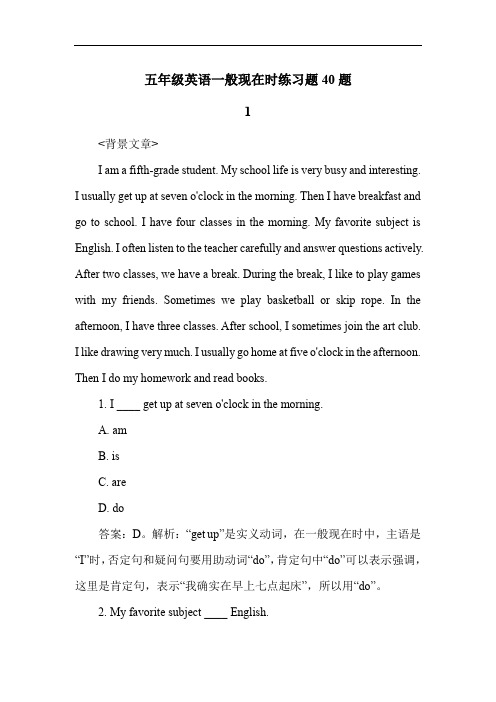
五年级英语一般现在时练习题40题1<背景文章>I am a fifth-grade student. My school life is very busy and interesting.I usually get up at seven o'clock in the morning. Then I have breakfast and go to school. I have four classes in the morning. My favorite subject is English. I often listen to the teacher carefully and answer questions actively. After two classes, we have a break. During the break, I like to play games with my friends. Sometimes we play basketball or skip rope. In the afternoon, I have three classes. After school, I sometimes join the art club.I like drawing very much. I usually go home at five o'clock in the afternoon. Then I do my homework and read books.1. I ____ get up at seven o'clock in the morning.A. amB. isC. areD. do答案:D。
解析:“get up”是实义动词,在一般现在时中,主语是“I”时,否定句和疑问句要用助动词“do”,肯定句中“do”可以表示强调,这里是肯定句,表示“我确实在早上七点起床”,所以用“do”。
五年级一般现在时的知识点归纳

五年级一般现在时的知识点归纳一、一般现在时的概念。
一般现在时表示经常的、习惯性的动作或存在的状态。
例如:I often play football on Sundays.(我经常在周日踢足球,表示经常做的动作);He is a student.(他是一名学生,表示存在的状态)二、一般现在时的构成。
1. be动词(am/is/are)- 当主语是I时,be动词用am。
例如:I am a girl.- 当主语是第三人称单数(he/she/it/单个人名、单个事物等)时,be动词用is。
例如:He is my brother. The cat is cute.- 当主语是you/we/they/复数名词时,be动词用are。
例如:You are my friends. They are students.2. 实义动词(行为动词)- 当主语是第三人称单数(he/she/it/单个人名、单个事物等)时,动词要变成第三人称单数形式(动词原形 + s/es)。
- 一般情况加s,如:like - likes,play - plays。
- 以s、x、ch、sh、o结尾的动词加es,如:go - goes,watch - watches。
- 以辅音字母 + y结尾的动词,把y变为i再加es,如:study - studies。
- 当主语是I/you/we/they/复数名词时,动词用原形。
例如:I like apples. They play basketball.三、一般现在时的时间状语。
1. 表示频率的副词:always(总是)、usually(通常)、often(经常)、sometimes(有时)、seldom(很少)、never(从不)。
例如:He always gets up early.2. 时间短语:on Sundays(在周日)、every day(每天)、in the morning (在早上)等。
一般现在时知识点译林版英语五年级上册
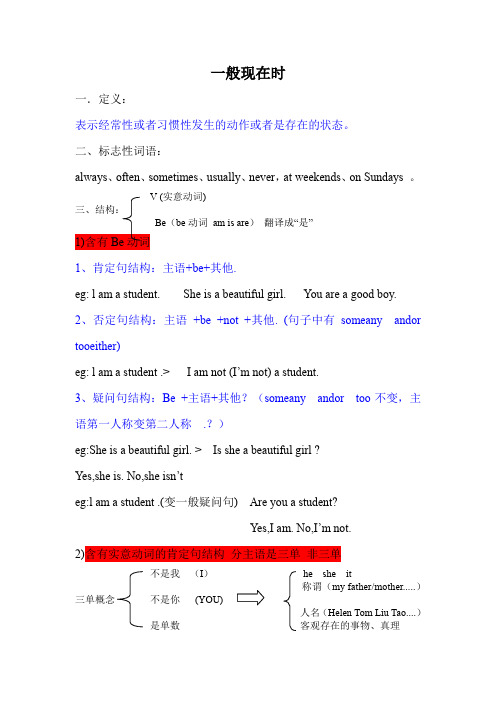
一般现在时一.定义:表示经常性或者习惯性发生的动作或者是存在的状态。
二、标志性词语:always 、often 、sometimes 、usually 、never ,at weekends 、on Sundays 。
实意动词)Be (be 动词 am is are ) 翻译成“是”1、肯定句结构:主语+be+其他.eg: l am a student. She is a beautiful girl. You are a good boy.2、否定句结构:主语 +be +not +其他. (句子中有someany andor tooeither)eg: l am a student .> I am not (I’m not) a student.3、疑问句结构:Be +主语+其他?(someany andor too 不变,主语第一人称变第二人称 .?)eg:She is a beautiful girl. > Is she a beautiful girl ?Yes,she is. No,she isn’teg:l am a student .(变一般疑问句) Are you a student?Yes,I am. No,I’m not.2)含有实意动词的肯定句结构 分主语是三单 非三单不是我 (I ) he she it 称谓(my father/mother.....) 三单概念 不是你 (YOU)人名(Helen Tom Liu Tao....) 是单数 客观存在的事物、真理动词三单V(三单)的变化规:1、直接在动词V后面加S.2、以S、X、Ch、Sh、O结尾的动词加es.3、以辅音加Y结尾的动词变Y 为i+es.4、havehas .主语是非三单:肯定句结构:主语+V(原形)+其他.I always visit my grandparents.否定句结构:主语+do+not (don’t)+V(原形)+其他.I always don’t visit my grandparents.一般疑问句结构:Do+主语+V(原形)+其他?(someany andor too 不变,主语第一人称变第二人称.?)Do you always visit your grandparents? Yes,I do. No,I don’t.主语是三单:A.肯定句结构:主语+V(三单)+其他.He swims very well.B.否定句结构:主语+does +not+V(原形)+其他.He does not (doesn’t) swim very well.一般疑问句结构:Does +主语+ V(原形)+其他?(someany andor too不变,主语第一人称变第二人称.变?)Does he swim very well? Yes,he does. No,he doesn’t.对划线部分提问:特殊疑问词+一般疑问句?I go to school on foot every day.1.对I 提问:Who goes to school on foot every day?(对主语人提问用特殊疑问词Who引导,Who作主语看做三单,后面接动词用动词三单.)2.对go to school提问:What do you do on foot every day?3.对school提问:Where do you go on foot every day?(后面没有地点,所以to省略)4.对on foot 提问:How do you go to school every day?5.对every day 提问:When do you go to school on foot?。
- 1、下载文档前请自行甄别文档内容的完整性,平台不提供额外的编辑、内容补充、找答案等附加服务。
- 2、"仅部分预览"的文档,不可在线预览部分如存在完整性等问题,可反馈申请退款(可完整预览的文档不适用该条件!)。
- 3、如文档侵犯您的权益,请联系客服反馈,我们会尽快为您处理(人工客服工作时间:9:00-18:30)。
一般现在时(The Present Indefinite)表示现在成为习惯或经常性的动作;现在进行时(The Present Continuous)则表示现在正在进行的动作。
1.1 现在进行时的构成
肯定句:主语 + am/is/are + 现在分词...
否定句:主语 + am/is/are + not + 现在分词...
疑问句:Am/Is/Are + 主语 + 现在分词...?
疑问代词/疑问副词 + am/is/are + 主语 + 现在分词...?
1.2 现在进行时的肯定句
句型:主语 + am/is/are + 现在分词...
构成方式:
They are cleaning the house.他们在打扫屋子。
He is brushing his teeth.他正在刷牙。
Mother is waiting for me.母亲在等我
1.3 现在进行时的否定句
句型:主语 + am/is/are + not + 现在分词...
现在进行时的否定句是在助动词am/is/are后加not:
I'm not doing anything right now.我现在没做什么事情。
She is not dancing,but doing exercise.她不是在跳舞,而是在锻炼。
1.4 现在进行时的疑问句
一般疑问句句型:Am/Is/Are + 主语 + 现在分词...?
回答方式:Yes,主语 + am/is/are.
No,主语 + am/is/are + not.
现在进行时的疑问句是将助动词am/is/are置于主语之前(大写am/is/are的第一个字母),在句尾加问号;这种语序是倒装语序:
Are you leaving already? 你这么早就要走了吗?
Is it raining now? —Yes,it is./No,it isn't.现在下雨吗? ——是的,在下雨。
/不,不下了。
Are they helping the old lady? —Yes,they are./No,they aren't.他们在帮助这位老
妇人吗? ——是的。
/不,没帮助她。
特殊疑问句句型:疑问代词/疑问副词 + am/is/are + 主语 + 现在分词...?
现在进行时的特殊疑问句是将疑问代词/疑问副词等置于助动词am/is/are之前
(am/is/are的第一个字母无需大写),和一般疑问句差不多;这种语序是倒装语序。
就主语提问时,将疑问代词或带有疑问限定词的名词词组置于助动词am/is/are之前,在句尾加问号;这种语序是陈述句语序:
Who are you waiting for? —I'm not waiting for anybody.你在等谁? ——我没在等谁。
What are you doing? —I'm just tying up my shoelaces.你在干什么? ——我在系鞋带。
What are you looking for? —I'm looking for my keys.你在寻找什么? ——我在找钥匙。
What time are you coming back? —I'm not sure what time I'm coming back.你打算什么时候回来? ——我不能肯定我将在什么时候回来。
What's your brother planning to do tomorrow? —He can't decide what to do.你兄弟明天打算做什么? ——他还没定要做什么。
Where are you going? —I'm going home.你到哪去? ——我回家去。
How are you feeling today? —I don't feel very well this morning.你今天感觉怎样? —今天早上我感觉不太舒服。
由于使用了be动词,因此进行时的否定句和疑问句的构成方式与be动词的否定句和疑问句的构成方式相同。
一般现在时和现在进行时的区别
一般现在时表示经常性的动作;现在进行时表示暂时性的动作。
Do you ever eat meat? —No,I never eat meat.你平常吃肉吗? ——不,我从不吃肉。
(习惯、经常性的动作)
I'm eating meat now.我正在吃肉。
(暂时性的动作)
My brother always forgets to wash behind his ears.我弟弟老是忘记洗耳后根的地方。
